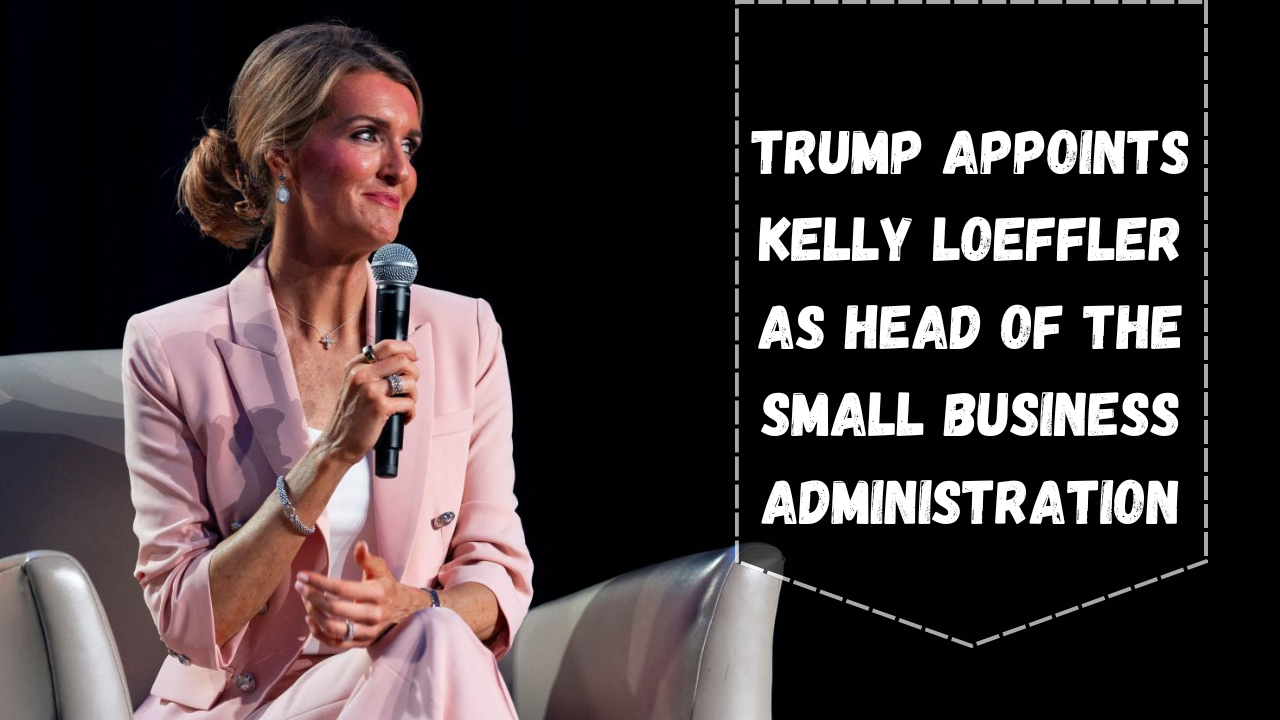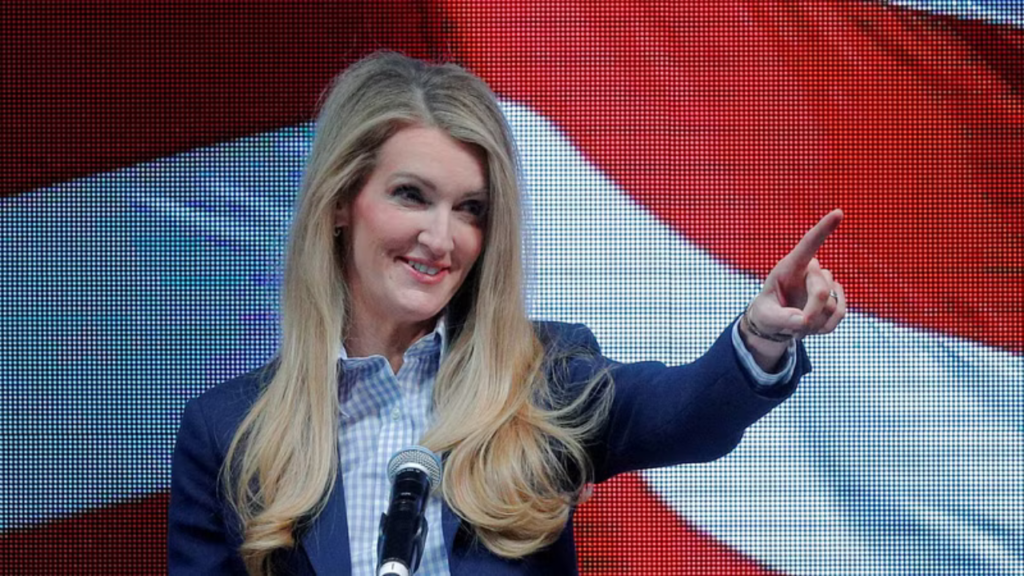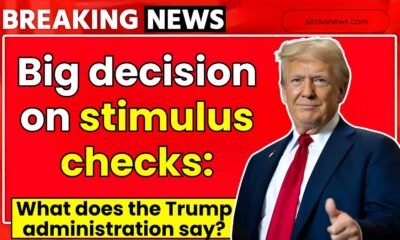Politics
Trump Appoints Kelly Loeffler as Head of the Small Business Administration
Published
7 days agoon
By
Supriya
Former President Donald Trump announced his choice of former Senator from Georgia Kelly Loeffler for the head of the Small Business Administration, which had widespread criticism and acclaim alike but has also reflected continued staying power within the ranks of the Republican Party with strategically oriented policy priorities towards the small businesses, recovery and economic orientation of this move.
Who is Kelly Loeffler?

In 2019, a political outsider and former business entrepreneur, Kelly Loeffler, was named to fill Johnny Isakson’s seat in the Senate who resigned. A fervent conservative, Loeffler was defeated in a runoff race in 2020 by Democrat Raphael Warnock. Loeffler’s politics demonstrated her firm support for pro-business policies, tax cuts, deregulation, and a market-driven approach to economic growth, despite her very short time in the Senate.
Before entering into politics, she had a pretty good financial life. Loeffler serves in high-level management with Intercontinental Exchange (ICE), the operator of leading global exchange for the ICE, the New York Stock Exchange, Euronext-together forming ICE Exchange-and NYSE Arca Options. Her history in private industry has furthered her belief in sound economic policy- free-markets and limited government; small business, as stated, is the foundation of American enterprise.
The SBA and Loeffler’s Potential Impact
In fact, the Small Business Administration helps the small business sector in America, which represents about half of the workers. The SBA’s budget exceeds a billion dollars. It provides millions of loans and other kinds of help to small companies all across the United States, most of which are located in underrepresented communities. It also played a very significant role in helping small business owners address a complex regulatory environment and providing them with tools for expansion and sustainability.
After the COVID-19 pandemic, the Loeffler appointment as the director of SBA would represent a shift in the agency’s direction toward jobs creation, economic recovery, and business-friendliness. The epidemic caused millions of closures, layoffs, and bankruptcies that hit small enterprises the most. Due to her pro-business background, Loeffler is expected to focus on reducing red tape and hastening processes in government and supporting legislation that allows small business owners to grow in an increasingly competitive global economy.
Read more:- Avocado and Coconut Refresher Smoothie
Pro-Business Ideology and Deregulation

Larger still, it seems consistent with a longer term, overall economic policy for the nation that has continuously backed tax reduction, deregulation, and less government involvement in the private sector, by having Loeffler aboard. Loeffler had long been a champion for the Tax Cuts and Jobs Act of 2017, which reduced corporate taxes and offered tax relief for small businesses, as senator. Her extensive experience in business and finance qualifies her to the position of SBA Administrator as she shares some economic ideologies with Trump.
She might also use the deregulation policy of the Trump administration, in particular with respect to labor laws, environmental regulation, and financial regulation. Loeffler’s record will ensure she is a fierce proponent of easing regulatory restraints on small businesses and opening up space for growth and hiring and competing in the market. Excessive regulation has often been identified as a major obstacle to growth for small firms.
One of the most immediate impacts Loeffler will have is in the lending program administration of SBA. The Pay check Protection Program, introduced during the COVID-19 pandemic, has been a lifeline for many enterprises fighting for survival as a forgivable loan option for small businesses. Loeffler could be a proponent of adjustments that would make these programs more effective and accessible so that businesses could receive funds quickly when they are needed. She could also focus on making SBA loan programs more accessible and transparent for minority-owned or rural businesses.
Controversy and Criticism
While Loeffler’s choice has drawn quite some criticism, her experience puts her in a more suitable light for many conservatives and business people. For others, Loeffler may not prove so empathetic toward concerns among small business owners in the locality she is operating out of due to her previously linked ties with Wall Street and her corporate experience. Although she says she is committed to the creation of opportunities for small businesses, critics say her wealth and experience in the financial industry make her vulnerable to the needs of large businesses more than the needs of small business owners.
There could also be bitterness against Loeffler over the brief period she spent in the Senate, where her 2020 re-election campaign was fiercely and very vigorously contested. In fact, owing to her public endorsement of Trump in the 2020 elections, Loeffler’s political background has been severely criticized as overly politicized, which might antagonize some business entrepreneurs with rather independent or center-line politics.
Others also point out that her appointment will further widen rifts within the small business community, especially if Trump’s policies continue to favor big corporations and the rich at the expense of others who barely scrape by. Since small businesses were one of the most affected in the pandemic, especially those in the retail or service industries, detractors argue that the SBA should focus on offering customized help to these sectors rather than pushing for a one-size-fits-all approach that favors large companies.
Looking Ahead: The Road to Recovery

Loeffler will likely face a challenging task to reinvigorate an economy that is still reeling from the pandemic’s effects when she assumes her new role as SBA Administrator. Increasing costs, a labour shortage, and supply chain disruptions remain issues for most small businesses. Loeffler will need to work closely with Congress, state and local governments, and the Biden administration to ensure that small businesses receive the assistance they need to recover and grow.
Maybe this decision is a barometer of what’s in the future for the Republican Party and, in particular, about how it will shape its relationships with small businesses. Will the GOP embrace tax cuts, deregulation, and other business-friendly practices or seek a new road that accounts for the problems unique to small companies going forward in the post-pandemic economy?
It is hard to predict just what shape future U.S. economic policy will take under such leaders as Donald Trump and his supporters, but Loeffler’s nomination underscores that small firms will play the critical role in the entire economic recovery.
Conclusion
The choice of Kelly Loeffler to head the Small Business Administration is a major step that will probably have a big impact on how small businesses operate in America in the future. With her financial experience and pro-business views, Loeffler is well positioned to back measures that place growth, deregulation, and tax breaks first. Meanwhile, Loeffler’s own selection also raises questions over how to balance assistance for major corporations with the need to ensure small businesses-most severely impacted by the pandemic-end up getting the focused help they really need. There will be intense scrutiny in determining whether Loeffler is able to navigate these hurdles and deliver on the promises made to small business owners across the country as the U.S. economy continues its recovery.
You may like
-


Big decision on stimulus checks: What does the Trump administration say?
-


Trump Confident in Hegseth’s Chances for Pentagon Appointment
-


Kash Patel, Trump’s Choice to Head the FBI, Reportedly Hit by Iranian Hack
-


Key GOP Senators Open to Skipping FBI Background Checks for Trump Appointments
-


Trump’s Bold Threat: 100% Tariffs on BRICS if They Launch New Currency
-


Trump Transition Team Says Cabinet Members Face Bomb Threats and Swatting Challenges
